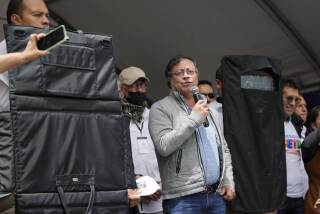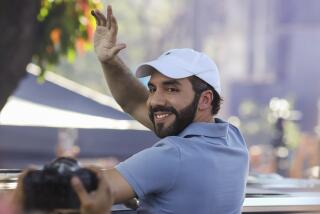Colombia’s presidential runoff Sunday influenced by rebel talks
- Share via
Reporting from Bogota, Colombia — Colombian voters appear deeply divided by the government’s peace negotiations with rebels, helping make Sunday’s presidential runoff election between incumbent Juan Manuel Santos and former Finance Minister Oscar Ivan Zuluaga too close to call, analysts say.
Santos initiated negotiations in Cuba in November 2012 with representatives of the Revolutionary Armed Forces of Colombia, or FARC, in a bid to end 50 years of conflict. Talks have dragged on and negotiators have reached broad framework agreements on just four of six negotiating points.
Polls show that although voters generally back a negotiated peace, a majority is against giving the FARC automatic representation in Congress or its leaders amnesty for crimes including drug trafficking, massacres and kidnapping. The rebels probably would demand such concessions as a prerequisite to laying down their arms.
The government also initiated talks with the National Liberation Army, a smaller insurgent group specializing in extortion and bombing oil pipelines, according to news reports this week. The Zuluaga camp criticized the initiative as eleventh-hour electioneering.
Zuluaga, who enjoys the backing of highly popular former President Alvaro Uribe, was the top vote getter in the first round of polling May 25, with 29% to Santos’ 26%. Santos since has scrambled to form alliances and gather endorsements from labor unions, business groups and leftist politicians to bolster his theme of the vote being a choice between peace and war.
Santos, 62, comes from a wealthy family that once owned the country’s most important newspaper, El Tiempo of Bogota. His great-uncle Eduardo Santos was president from 1938 to 1942.
Zuluaga is a 55-year-old businessman who was mayor of a small town before serving in Uribe’s Cabinet.
In addition to voter ambivalence over the peace talks, Santos also is fighting low voter confidence in his government and the perception that overall conditions in Colombia have worsened since he took office. Critics point to a higher crime rate, more big city traffic and ongoing crises in the pension and healthcare systems.
At the start of the campaign, Zuluaga said he favored a military victory over a negotiated settlement with the FARC, reflecting many Colombians’ deep distrust of a rebel group that has conducted negotiations in bad faith and as a ruse to regroup, critics have said. But Zuluaga has since softened his initial opposition, saying he would suspend the talks for re-appraisal and demand the FARC stop all violent activities as a condition of resuming negotiations.
Uribe’s influence four years after leaving office was demonstrated not only by Zuluaga’s first-round plurality but also when he and 19 other backers won Senate seats this year. The former president’s ratings have consistently outpaced those of Santos in recent months.
Although final opinion polls gave a mixed picture of whom voters prefer, the firm that was closest in forecasting Zuluaga’s May victory gave the challenger a 49%-to-41% lead in a survey published Sunday.
Still, analyst and former Ambassador Fernando Cepeda said several variables at play make the outcome hard to predict, especially when a third of all voters have described themselves in opinion samplings as undecided.
“For Zuluaga the uncertainties include how the uncommitted voters will resolve the peace dilemma, while for Santos it’s their ambivalence toward him despite the very favorable economy and image overseas,” Cepeda said. “It’s been a very unusual campaign.”
Officials said the May election drew only 40% of the nearly 27 million eligible voters, a near-record level of abstention.
Kraul is a special correspondent.
More to Read
Sign up for Essential California
The most important California stories and recommendations in your inbox every morning.
You may occasionally receive promotional content from the Los Angeles Times.












